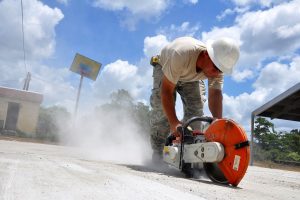
The US economy is officially in recovery mode after making it through the depths of the Great Recession which began in ’08 and ’09. That’s good news for American business – jobs are being added, people are spending more money, and the economy is growing, including the notoriously cyclical construction industry.
However, one unfortunate aspect of a recovery is that, on a geographic basis, not everyone gets to share in the recovery equally. In other words, while some regions of the country are busting at the seams with new economic growth, new jobs, and new construction, other regions of the country may be growing at a much slower rate, or even not at all.
This economic disparity across the different regions of the country presents a difficult challenge for those in the construction business: if your business is located in a state or region with a slow pace of growth, would you consider taking on a project in another state where construction work is more plentiful?
Crossing State Lines in Search of Opportunity is as American as Apple Pie
It must be noted that traveling in search of work, a better opportunity, or a new job is as American as Apple Pie. The great Dust Bowl migration of the 1930s is perhaps the quintessential example of people uprooting their entire families in search of a better life. And of course, people move for work on a much smaller scale every single day. Where’s it’s taking a job in another town, another state, or across the country – work-related moves have been around about as long as work itself.
It’s Different for Contractors (and more challenging)
As everyone in the business already knows, construction is different from other lines of work. For a lot of folks in the industry, this “difference” is a good thing – they love the work, and many of them couldn’t even imagine doing anything else to make a living. But some of these differences represent challenges that are unique to construction. For contractors that want to take on out-of-state work, these challenges can become obstacles or worse.
Read on for the 3 biggest dangers contractors have to overcome to take on work in another state.
1. Licensing Requirements
While dependent on state-specific rules, many construction participants require some form of license. If you’re thinking about a project in a different state that has strict licensing regulations, neglecting to get the required license can potentially land your company in hot water. And this danger extends to getting paid, because if a payment issue arises on a project in a state where a license is required, without that license you may have forfeited your mechanics lien rights. And if you lose your lien rights, then you’ve lost the most powerful tool available to construction companies to remedy payment issues on their projects.
2. Different Interpretations of Construction Contracts
A famous poet once said, “a rose is a rose is a rose,” but unfortunately, there’s very little poetry in the world of construction contracts! That means that a certain clause may mean one thing in the state where you normally work, but that same clause might have a completely different interpretation in another state.
Along these same lines, some states allow for certain clauses in their construction contracts while in other states, those clauses are forbidden. This is exemplified by Pay-When-Paid and Pay-If-Paid clauses.
3. Lien and Notice Requirements and Deadlines Are Different in Every State
We bring this point up a lot because it’s true, and, because it’s a major stumbling block that can have a tremendous impact on your ability to get paid what you’ve earned.
Every state’s mechanics lien law is different. It doesn’t matter what your role is (general contractor, subcontractor, material supplier, or equipment rental), and it doesn’t matter which aspect of lien rights we’re talking about (preliminary notices, waivers, mechanics liens, or bond claims).
Everything is different, and if you’re working on a job in a different state than where you normally work, you must be aware that the way things work there can be vastly different from what you’re used to.
Free Resource
Click to download the Disaster Recovery Cheat Sheet, an essential resource for any contractor that’s thinking about getting involved in an out-of-state reconstruction effort due to a natural disaster.


